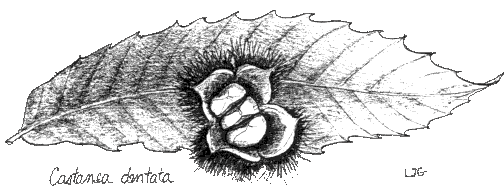

Harvest this year will be closed again. Apologies to those of you who enjoy collecting your own chestnuts and participating in the harvest work. Thanks for your understanding.
These closed harvests are allowing us to monitor natural timing of nut release among our trees as well as examine the effects of a different harvest method.
We are interested in assessing overall health of our chestnuts after collection of nuts solely from the ground (rather than cutting burs out of the trees). Though bur removal is a common practice for harvesting from fruiting trees, special considerations related to the biological and physiological effects of this practice should be given to important trees, like those in our breeding orchard.
Trees form a natural barrier before releasing leaves or burs, to prevent an open wound. Because not all burs will be ready to separate from a tree at the same time, using a fruit picking tool would need to be done daily in order to take only burs with stems that have formed a complete barrier. Ripping off a bur without a fully formed barrier, is likely to tear or peel bark on the branch. This has the same effect as storm damage, forming a jagged wound that is difficult for a tree to heal quickly, leaving time for pathogens or insects to move in.
Any method of removing burs from trees often includes removing leaves and buds as well. This presents several issues: Cutting off buds will eliminate the potential growth (shoots, leaves and burs) those buds would have produced the following year. Additionally, buds on the tips of branches (apical buds), are responsible for chemical signaling to the rest of the tree. Removal of an apical bud confuses the tree and inhibits the growth of buds behind it on a branch, reducing growth, resource harnessing ability (through leaves) and ultimately reducing nut production. Forcing a tree to waste its store of energy to regenerate leaves, etc. also makes it more vulnerable to pathogens, or at least less equipped to isolate them from its major transport systems.
In the interest of maximizing nut production and ensuring the health of our trees, majority of nuts this year will be collected daily from the ground. The rest we will gently knock out of the open burs still affixed to the trees. 2024 spring growth will show evidence of the ground harvest method's effect on our orchard tree health, and next autumn we will be able to compare nut yields.
Chestnuts vary in their nut-release timing, so the full harvest window will most likely extend from the beginning of September into the middle of October. We will send treated nuts out as available during the month of October. Nuts will be sent out to growers in the same order as Nut Request Forms are received by us.
PLEASE REMEMBER TO PREPARE YOUR PLANTING SITES AHEAD OF HARVEST!
Spaces should be ready by the end of September at the latest in order to allow soil to settle. Chestnuts should be planted as soon as possible after you receive them.
If you are a new Cooperator interested in growing all-American ACCF chestnuts, we ask you to please take a year to familiarize yourself with the Castanea dentata species, the ACCF's goals and approaches and to prepare the site you have selected for growing. Please read through the following materials included with your newsletter: ACCF Program Summary, 2023 Cooperating Grower Agreement, Planting Information and the Grower's Report Form (which should be completed annually after your seedlings have begun to grow.)
If you have been a Cooperator for longer than a year and are interested in growing American chestnuts from the 2023 Harvest, please print and complete both the attached Nut Request Form and the 2023 Cooperating Grower Agreement.
Mail to: ACCF, P.O. Box 102, Ridgecrest, NC 28770.
It is exciting to have so many Cooperators reporting nut-producing chestnuts! Applause and appreciation for your dedication, stewardship and great work.
Please note that "American chestnuts grown from the ACCF breeding program" include those grown from nuts produced on the ACCF chestnuts grown by Cooperators.
If your ACCF chestnuts are producing their own nuts and you distribute those nuts, we require a list of recipients and a signed 2023 Cooperating Grower Agreement from each of those individuals. Each will be considered a new Cooperator and will need to know how to properly plant, care for and record/report on their ACCF chestnuts. Please also provide your nut recipients information about the parent trees of nuts you distribute.
If you distribute nuts from your trees, it is important to provide treated nuts to recipients (and to treat your nuts that you plant yourself). Temperature and treatment time are critical to viability of the nuts. To properly treat nuts harvested from your own trees, refer to the attached Nut Processing Instructions.